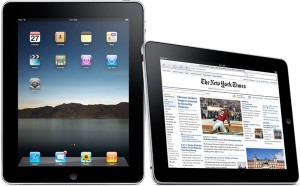iPad
2010-04-08
by Richard White
So… yeah. I bought an iPad.
I pre-ordered, and got in line at 6am to hang out with some other really nice people, including Carlos, the youth minister to gang-bangers, and Abraham Peters, who graciously took a picture of all of us standing in line, and the German guy from London, who happened to find himself in the States at the right time and managed to buy a reservation from some guy on Craigslist.
I bought two iPads, actually: one for myself, because I’m an Ed Tech guy, and I have a feeling this is going to be a Very Big Deal. And one for my Dad, because this thing is so made for him.
Picture my Dad, hunched over in the cold, drafty office, reading the online New York Times every morning on an ancient computer screen. Eventually he gets up, rubs his lower back, and heads off into the kitchen where he’ll make some breakfast, sit down at the table, and settle in to read the local newsrag, a pitiful thing that barely qualifies as journalism.
The iPad was made for my Dad. Now, he’s eating his eggs and reading the New York Times online on the blazing bright LED screen, flipping through articles, and emailing me the ones that he especially likes. It’s business as usual… only infinitely better.
We sat on the couch and watched an episode of “Glee” together—he’d never seen it before, and absolutely loved it. We set up Netflix streaming for him. We looked at the books in the online bookstore. At the rate we were going, I’ll be surprised if he ever gets on the computer again, unless it’s to sync his most recent photos to the iPad. Then he’ll unplug, them pack up the little tablet, and take it to my Mom to give her a slide show on the thing.
As for me and my iPad? I’m not as much of a convert. You can read the excellent comments of David Pogue, or John Gruber, or Andy Ihnatko, or this excellent article at Ars Technica, and they say more or less what I say: it’s fast. It’s beautiful. It represents, for many people, the future of computing, where our devices are powerful, and simple, and seamlessly integrated into our lives to the point that we have a hard time remembering what life was like without them. I don’t doubt that that’s going to happen. In fact, I hope it happens—I have a little money invested in Apple, and my son is starting college next year.
But as of this writing, it doesn’t seem to be my thing. It’s a great machine for consuming content, there’s no denying; YouTube never looked so good. But for content creators like myself, or anyone who needs a little more control over their computer—anyone who wants to drive a stickshift—the iPad’s automatic transmission is probably going to be a frustrating experience.
- Want to read a PDF document? You’ll have to email it to yourself, or use a third-party app to get it onto the iPhone’s hermetically-sealed file system.
- Want to edit a Word document? You’ll have to buy the $9.99 neutered version of iWork’s Pages, open up the document in that, edit it, then “Save As…” a Word document, plug in your iPad to your main computer, use iTunes to Export a copy of the document, and then fix any fonts, formatting, or layout that got changed in the process.
- Want to backup your files? Well, you sort of back them up every time you sync, although you can’t actually restore an individual file. You can make a copy of a file from the iPad (for a limited number of applications) by exporting, but you’ll have to go through and do that on a file by file basis. There’s no facility for backing up the entire machine and restoring individual files.
I don’t want to complain too loudly; any device manufacturer on the planet would KILL to have a product like this in their stable. And I totally get that this is going to be a hit.
Facebook’s a hit, too, though. That doesn’t necessarily mean that it’s something that fits my lifestyle, or my workflow.
The typing I do, the websites that I design, the video editing I do, the podcasts I record, the DVDs I rip, the music I record and mix, the presentations I deliver, the programming I do… none of those exist in the world of the iPad in any meaningful way.
And yet…
It’s a very import development, technologically, and I’m looking forward to seeing where we go from here.
It’s an exciting time to be a technologist.

